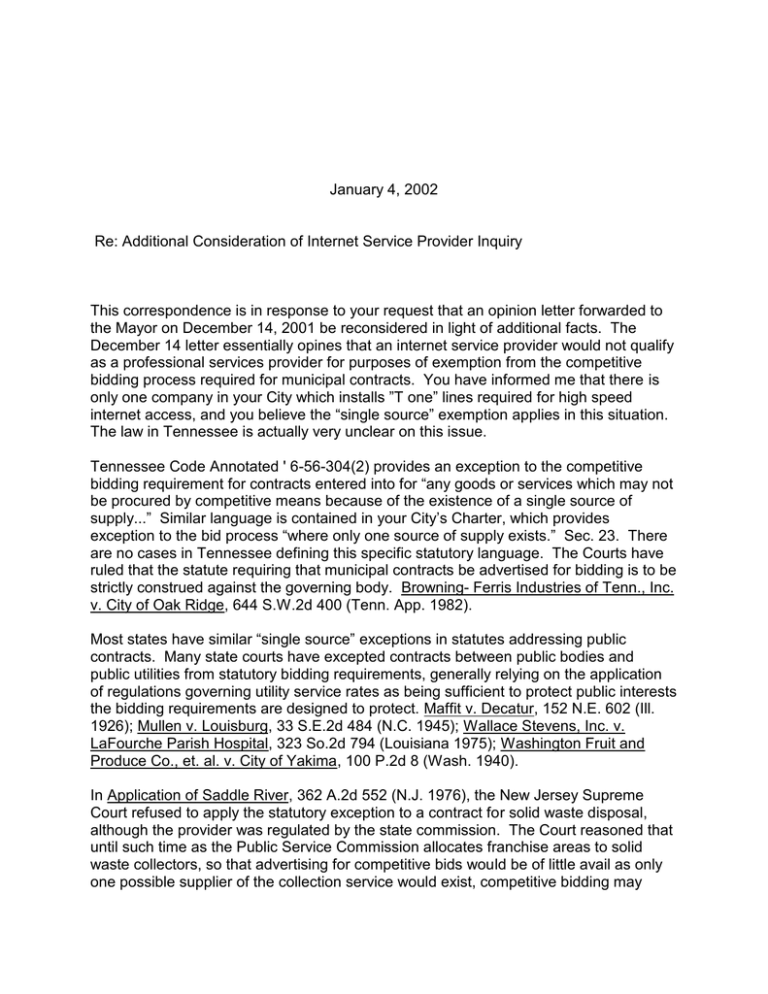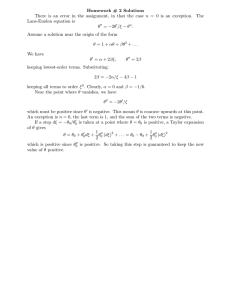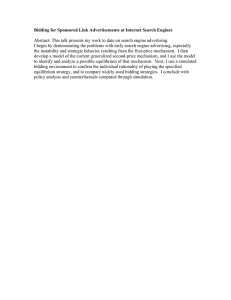January 4, 2002 Re: Additional Consideration of Internet Service Provider Inquiry
advertisement

January 4, 2002 Re: Additional Consideration of Internet Service Provider Inquiry This correspondence is in response to your request that an opinion letter forwarded to the Mayor on December 14, 2001 be reconsidered in light of additional facts. The December 14 letter essentially opines that an internet service provider would not qualify as a professional services provider for purposes of exemption from the competitive bidding process required for municipal contracts. You have informed me that there is only one company in your City which installs ”T one” lines required for high speed internet access, and you believe the “single source” exemption applies in this situation. The law in Tennessee is actually very unclear on this issue. Tennessee Code Annotated ' 6-56-304(2) provides an exception to the competitive bidding requirement for contracts entered into for “any goods or services which may not be procured by competitive means because of the existence of a single source of supply...” Similar language is contained in your City’s Charter, which provides exception to the bid process “where only one source of supply exists.” Sec. 23. There are no cases in Tennessee defining this specific statutory language. The Courts have ruled that the statute requiring that municipal contracts be advertised for bidding is to be strictly construed against the governing body. Browning- Ferris Industries of Tenn., Inc. v. City of Oak Ridge, 644 S.W.2d 400 (Tenn. App. 1982). Most states have similar “single source” exceptions in statutes addressing public contracts. Many state courts have excepted contracts between public bodies and public utilities from statutory bidding requirements, generally relying on the application of regulations governing utility service rates as being sufficient to protect public interests the bidding requirements are designed to protect. Maffit v. Decatur, 152 N.E. 602 (Ill. 1926); Mullen v. Louisburg, 33 S.E.2d 484 (N.C. 1945); Wallace Stevens, Inc. v. LaFourche Parish Hospital, 323 So.2d 794 (Louisiana 1975); Washington Fruit and Produce Co., et. al. v. City of Yakima, 100 P.2d 8 (Wash. 1940). In Application of Saddle River, 362 A.2d 552 (N.J. 1976), the New Jersey Supreme Court refused to apply the statutory exception to a contract for solid waste disposal, although the provider was regulated by the state commission. The Court reasoned that until such time as the Public Service Commission allocates franchise areas to solid waste collectors, so that advertising for competitive bids would be of little avail as only one possible supplier of the collection service would exist, competitive bidding may result in considerable savings to the municipality and is required for all such contracts. The Washington Supreme Court used similar reasoning in allowing the exception to apply in Washington Fruit and Produce Co., et.al. v. City of Yakima, 100 P.2d 8 (Wash. 1940). The Court held that competitive bidding requirements do not apply to a contract for the furnishing of a public utility by a company having a clear monopoly, since the advertising for bids would be useless. Other courts have applied the exception to contracts for services only when it is clear that such services cannot be obtained elsewhere. Los Angeles Gas & Electric Corp. v. Los Angeles, 205 P. 125 (Cal. 1922); Hartford v. Hartford Electric Light Co., 32 A. 925 (Conn. 1895). “Where in the very nature of things competition would be impossible, it could not be supposed with any degree of justification that the legislative purpose was to compel the municipality to go through the useless form of letting to the lowest bidder when in fact there could be but one bidder...” Mullen v. Town of Louisburg, 33 S.E.2d 484, 488 (N.C. 1945). In all of the above decisions, the courts focused on whether additional bids could be submitted, not on the source of the service or product provided. The Michigan Supreme Court declined to allow the exception in Hunt v. Fenlon, 21 N.W.2d 906 (Mich. 1946), declaring that the number of sources of supply is immaterial, and that it could not be simply assumed that the proposed supplier would be the only source of supply. The Pennsylvania Supreme Court reached a similar conclusion in Philadelphia Co. v. City of Pittsburgh, 97 A. 1083,1085 (Pa. 1916), stating: The parties who could determine whether, under the circumstances, it was practicable and profitable for the other two companies to compete for the present contract were not the city officials whose duty it was to let the contract...but the companies themselves, and their judgment could only be ascertained in the manner prescribed in the city charter [requiring competitive bidding on all contracts]. One case in Tennessee may be helpful in determining how the Court will apply the single source exception. In Town of Smyrna v. Ridley, 730 S.W.2d 318 (Tenn. 1987), the Court rejected the defendant mayor’s assertion that the Chevrolet dealership the city contracted with was the only Chevrolet dealership in town and had a service department open 24 hours a day to service the city’s vehicles. The case concerned a conflict of interest, which may be waived under circumstances similar to the “single source” exception. T.C.A.' 6-54-107(b). The Court was not convinced that the dealership was the only business capable of servicing the vehicles in the area. The voluminous research I have conducted on this specific exception has not changed my opinion that the contract for the installation of the necessary phone line and high speed internet service obtained by your City should have been submitted for bids. The reason my opinion has not changed is the analysis employed by virtually every court that, except when a clear monopoly exists, a municipality should not assume that only one bidder exists for any service, and the emphasis the courts placed on bidders as opposed to sources of supplies and services. It is my understanding that there may be only one company which installs “T one” lines in your City, but the company does install such lines for other high speed internet access providers. Therefore, although this company may be the only source for installation of the line, other suppliers may exist with which the company subcontracts for such work. As the Courts point out, the only way to know if other services exist is to advertise a contract for bids. My opinion is nothing more than a conclusion reached after reading numerous cases from other jurisdictions. As there are no Tennessee cases on point from which to determine the Courts’ interpretation of the exception, this is a very murky legal issue about which I may very well be wrong. The common thread which appears throughout this area of law is to err on the side of caution, which is what I believe I have done in reaching my conclusion. I hope this information is sufficient to answer your questions. Sincerely yours, Melissa A. Ashburn Legal Consultant


